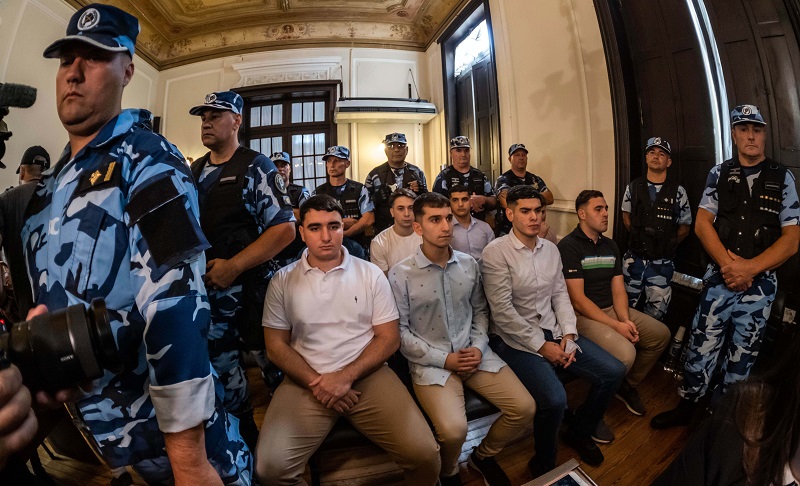
Finally, after several weeks of oral and public debate (the latter halfway, since a large part of the hearings were not broadcast), the Criminal Court No. 1 of Dolores announced the sentence against the eight accused of murdering Fernando Baez Sosa the early morning of January 18, 2020 at the exit of the bowling alley The Brick from Villa Gesell.
The judge Maria Claudia Castro and their peers Christian Rabaia y Emiliano Lazzari unanimously decided to condemn Maxim Thomsen, Cyrus Pertossi, Enzo Comelli, Matias Benicelli, Luciano Pertossi to the penalty of life imprisonment for considering them “co-perpetrators criminally responsible for the crimes of doubly aggravated homicide by the premeditated cooperation of two or more people and by treachery” and “minor injuries”. while to Ayrton Violaz, Blas Cinalli y Lucas Pertossi they were sentenced to fifteen years in prison for considering them “secondary participants”.
In turn, the Court rejected the request for annulment of the trial that had been presented by the defendants’ defense.
A witness case in many respects
Perhaps because it took place in the summer (when “nothing happens”) and surely because of the legitimate indignation that Fernando’s murder produced, the trial drew the eyes of millions of people. The names of the eight defendants, on behalf of their relatives, of Silvino Baez y Grace Sosaof the lawyer Hugo Tomei and other protagonists of this process became part of daily conversations in the workplace, at home and in the neighborhoods.
Hence, this second week of February in Argentina has started out of the ordinary. Cameras and microphones everywhere, reporters sent special to Dolores (even from Paraguay), radio and television programs out of routine and a journalistic “hysteria” to obtain minute-by-minute “exclusives”. A true “national network” without official speeches or economic or political announcements.
Undoubtedly one of the most mentioned names is that of media and farandulero Fernando Burlando, in charge together with its partners of the legal sponsorship of the victim’s family. That is probably one of the biggest curiosities of the case. It deserves an analysis in itself (for another time, of course) how a law firm whose lawyers saw their “prestige” (and their coffers) grow by defending murderous policemen (as in the case of José Luis Cabezas), rich in trouble (such as Juan Darthés for abusing Telma Fardin) and gangsters of all kinds was turned into little less than the embodiment of good and justice by the media spokespersons (without crack) who propagate their ideas.
Ideas typical of the bourgeois worldview, where the social causes of crimes like this are hidden behind the scenes while their consequences are limited to individual names and surnames, which are squeezed ad nauseam to turn them into “news.”
Burlando will soon begin his electoral campaign in the province of Buenos Aires, heading the list of a party that he himself created a short time ago. It will be necessary to see how much he will be able to capitalize on everything exposed and vociferated in these months around the case of Fernando Báez Sosa.
As Octavio Crivaro reflected in The Left Daily In the Báez Sosa case, a large part of the “opinion makers” shamelessly combined the just repudiation before the crime with “a mortar that mixes punitivism, banalization of prison brutality, appreciation of the culture of torture and of the rape” in a due of “Retaliation Law with amphetamines, where a hateful crime corresponds to a much worse sentence, torture, sexual abuse and, for some, also death”.
Once again it is affirmed, from a Marxist and socialist vision, that the Penal Code is nothing more than the articulated translation of what for powerful and dominant minorities is “crime”. Beyond this case (where the defendants would have a little more “power” than their victim), it is an objective fact that prisons are overcrowded with poor people, who spend years locked up without even being convicted and that almost all of them are locked up. for crimes punishable by laws that always privilege private property over human life.
Hence, taking the Penal Code and the sentences handed down by judicial castes far from the population as an expression of “justice”, where the penalties would serve as “reparation” for the victims and “exemplary punishment” for the perpetrators, is a disservice to the social system that causes, guarantees and reproduces the vast majority of crimes that populate the “police” sections of journalistic companies.
As Crivaro affirms, once again a case of extreme popular sensitivity has been taken that generated repudiation and indignation as has rarely been seen, to “sneak in” a hyper-punitivist campaign together with “a general laundering of questioned protagonists and a trivialization of atrocious institutions and unpleasant characters, who also suck their fingers after their systematic actions of state impunity”.
Source: www.laizquierdadiario.com

